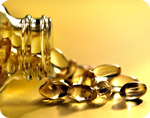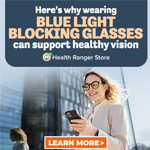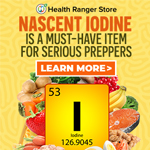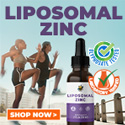
Higher Doses of Vitamin D Needed to Prevent Cancer
Friday, April 25, 2008 by: David Gutierrez, staff writer
Tags: vitamin D, cancer prevention, health news
- Warp Speed 2.0: Trump Administration ACCELERATES Gates-funded, self-amplifying bird flu vaccines
- DMSO and Natural Dyes: A suppressed cancer treatment resurfaces in independent research
- Chemical cocktails in processed foods linked to diabetes, validating natural health warnings
- Transhuman vectors of disease: Young adults continue to produce spike proteins ONE YEAR after receiving COVID vaccine
- Study finds bananas more effective than salt reduction for lowering blood pressure
- 8 U.S. states may EXPAND vaccine exemptions in 2025, and parents have many reasons to STOP THE SHOTS
- Prominent doctors call for new holistic therapies to address CANCER SPIKE: Tree barks provide anti-cancer treatment options
- Fermented foods like sauerkraut may outshine modern medicine in gut health, research finds
- STAGING BEFORE RELEASE: WHO Runs 2-Day Pandemic Simulation 'Exercise Polaris'
- Ancient mummies rewrite human history with “ghost” lineage discovery
- Aerosolized bioweapons? Strange “diploid biomasses” falling out of the sky in Florida captured under the microscope
- Surge in KIDNEY FAILURES linked to common medications
- Millions of gun owners could be challenged in court and lose their firearms if DOJ doesn’t step in to stop crazy ATF rule
- Mike Adams releases country western hit single: Goin’ Back in Time is Comin’ Home
- Analysis: The coming economic collapse, a mass uprising and Trump's three secret weapons to halt the growing revolt
- Widespread social and economic unrest: Steve Quayle issues urgent financial warning of imminent asset collapse in new interview with Mike Adams
- U.S. lawmakers investigate Meta over alleged China collaboration
- Israeli lobbyists boast of controlling US national security policy in leaked AIPAC audio
- Aerosolized bioweapons? Strange “diploid biomasses” falling out of the sky in Florida captured under the microscope
- Fauci is back in the limelight, and he’s busy promoting a future COVID or FLU pandemic
- Tulsi Gabbard leads charge against the Biden regime’s global censorship of the 'Disinformation Dozen'
- Analysis: The coming economic collapse, a mass uprising and Trump's three secret weapons to halt the growing revolt
- Widespread social and economic unrest: Steve Quayle issues urgent financial warning of imminent asset collapse in new interview with Mike Adams
- Kiss Your Genetic Privacy Good-Bye! 23andMe Gets Green Light to Sell Your Intimate Genetic Details to Anyone They Want
- U.S. lawmakers investigate Meta over alleged China collaboration
- Mike Adams releases country western hit single: Goin’ Back in Time is Comin’ Home
- Israeli lobbyists boast of controlling US national security policy in leaked AIPAC audio
- Chemtrails unveiled: How the CIA and Big Business are manipulating the weather for profit
- Curcumin’s ancient healing power supercharges muscle recovery, and its effects are compounded with anti-inflammatory foods and supplements
- CLOT SHOT PLANDEMIC UNFOLDING: Fibrous, rubbery clots caused by covid injections have prion-like seeding activity
- China’s counter-tariff strategies: A new chapter in the U.S.-China trade war
- Pfizer's RSV vaccine linked to preterm births as drug giant CONCEALED RISKS from pregnant women in unethical clinical trials
- Shedding light on the dark side of MMR vaccines: How vaccinated individuals SPREAD MEASLES & put the vulnerable at risk
- Dane Wigington exposes climate engineering as ‘All-Out Weather and Biological Warfare’
- Defunding DEADLY mRNA jabs: Government funding for mRNA technology being scrutinized and sidelined until proven "safe and effective" for real
- DEATH by VACCINE or face PRISON time: Canadian Freedom Convoy leaders CONVICTED for protesting forced vaccination during the Covid Plandemic
- Newly released JFK files reveal Pentagon's role in creating Lyme disease and covid in the same lab
- Analysis: The coming economic collapse, a mass uprising and Trump's three secret weapons to halt the growing revolt
- Mike Adams releases country western hit single: Goin’ Back in Time is Comin’ Home
- Aerosolized bioweapons? Strange “diploid biomasses” falling out of the sky in Florida captured under the microscope
- Kiss Your Genetic Privacy Good-Bye! 23andMe Gets Green Light to Sell Your Intimate Genetic Details to Anyone They Want
- European Court of Justice: Healthcare professionals who promoted or administered COVID-19 vaccines are CRIMINALLY LIABLE for any harm caused
- Federal employees whine over DOGE's new directive requiring them to do a 5-point summary of weekly accomplishments
- U.S. approves new Russian ambassador as diplomatic thaw continues
- Government waste exposed: Hegseth supports Musk’s demand for accountability from federal workers
- Now you can HEAR chemistry: Health Ranger translates molecules into music in stunning video demonstration that will blow your mind (and your ears)
- Widespread social and economic unrest: Steve Quayle issues urgent financial warning of imminent asset collapse in new interview with Mike Adams
- Dr. Mike Yeadon releases 15-minute testimony - WATCH - about genocidal intent of COVID “vaccines”
- The Health Ranger releases “Vaccine Zombie” song and music video, using AI-animated zombies for the music video
- Trump reverses course on Gaza plan, says “nobody is expelling Palestinians”
- EPA advisor admits the agency is funneling billions to climate groups ahead of Trump’s return to White House
- 5 Simple steps to boost your brainpower: How to strengthen executive function in a distracted world
- I Want My Bailout Money – new song and music video released by Mike Adams
- Tulsi Gabbard leads charge against the Biden regime’s global censorship of the 'Disinformation Dozen'
- Red Cross issues warning to stop blood plasma donations from vaccinated people
- Scientists confirm: GENIUS brain function can be spontaneously unleashed in humans without any apparent cause
- EPA advisor admits the agency is funneling billions to climate groups ahead of Trump’s return to White House
- HYSSOP: What research reveals about the health benefits of this ancient holy herb
- Two containers with completed ballots fall out of truck in Florida
- Newly released JFK files reveal Pentagon's role in creating Lyme disease and covid in the same lab
- Global leaders unite to clamp down on “misinformation” with UN-backed Cascais Declaration
- BREAKING: 2025 NDAA authorizes mandatory military draft of WOMEN across America… as Pentagon pursues global NUCLEAR war with both Russia and China at the same time
- Mike Adams releases country western hit single: Goin’ Back in Time is Comin’ Home
- Michael Yon warns of a ZIONIST TAKEOVER in Trump’s second administration
- Ozempic and Wegovy weight loss drugs are injectable LIZARD VENOM PEPTIDES that may unleash a devastating wave of organ failure… side effects align with symptoms of SNAKE BITES
- The Health Ranger releases “Vaccine Zombie” song and music video, using AI-animated zombies for the music video
- BOMBSHELL: DNA testing kits are a SCAM to develop ethnic-specific bioweapons
- Israeli soldiers accused of even more torture and abuse in the West Bank
- These 13 countries just signed an agreement to engineer a global FAMINE by destroying food supply
- I Want My Bailout Money – new song released by Mike Adams
- NASA admits that climate change occurs because of changes in Earth’s solar orbit, and NOT because of SUVs and fossil fuels
- RFK Jr. clears key hurdle: Sen. Susan Collins backs controversial HHS nominee, signaling a new era for health policy
Vitamin D is an essential nutrient produced by the body when ultraviolet radiation from sunlight strikes the skin. In northern latitudes, however, when sunlight is dim for significant parts of the year, many people cannot get enough sun to synthesize sufficient levels of the vitamin. This problem is particularly pronounced among those with darker skin. Few foods are rich in vitamin D. Fish oil and fortified food sources, such as milk or non-dairy milk substitutes, provide the most common dietary sources.
The United States and Canadian governments recommend a daily vitamin D intake of 200 IU. But vitamin D and cancer experts warn that this value is far too low.
Recently, the Canadian Cancer Society advised that light-skinned people take a 1,000 IU vitamin D supplement daily during fall and winter months, and that dark-skinned people or those who regularly keep all their skin covered while outdoors take a supplement year-round.
"We're recommending 1,000 IU daily because the current evidence suggests this amount will help reduce cancer risk with the least potential for harm," said Heather Logan, director of the society's Cancer Control Policy.
"I have to commend the Canadian Cancer Society," vitamin D researcher Joan Lappe said. "They're right out in the lead there on changing the recommendations."
Lappe was lead researcher in a recent study that found that women taking 1,100 IU of vitamin D per day showed a 60 percent reduced risk of developing cancer than women taking a placebo. Excluding women who developed cancer during the first year of the four-year study, the risk reduction from vitamin D was 77 percent.
In a paper published in the "American Journal of Clinical Nutrition," a group of vitamin D experts recently advised that an upper daily limit of 10,000 IU be set for vitamin D exposure, making a break with the current, more cautious, government recommendations.
Vitamin D at FETCH.news
Get independent news alerts on natural cures, food lab tests, cannabis medicine, science, robotics, drones, privacy and more.
Take Action: Support Natural News by linking to this article from your website
Permalink to this article:
Embed article link: (copy HTML code below):
Reprinting this article:
Non-commercial use OK, cite NaturalNews.com with clickable link.
Follow Natural News on Facebook, Twitter, Google Plus, and Pinterest
Science News & Studies
Medicine News and Information
Food News & Studies
Health News & Studies
Herbs News & Information
Pollution News & Studies
Cancer News & Studies
Climate News & Studies
Survival News & Information
Gear News & Information
News covering technology, stocks, hackers, and more



"Big Tech and mainstream media are constantly trying to silence the independent voices that dare to bring you the truth about toxic food ingredients, dangerous medications and the failed, fraudulent science of the profit-driven medical establishment.
Email is one of the best ways to make sure you stay informed, without the censorship of the tech giants (Google, Apple, Facebook, Twitter, YouTube, etc.). Stay informed and you'll even likely learn information that may help save your own life."
–The Health Ranger, Mike Adams













































